- Home
- Rosamunde Pilcher
Flowers in the Rain & Other Stories Page 5
Flowers in the Rain & Other Stories Read online
Page 5
“You have nothing to feel guilty about. I think you’ve come through a long dark tunnel, all on your own, and you’re still in one piece, and you’ve still got Crispin. As for Terence, you can write him down to experience.”
“Then you don’t think this house is another mistake?”
“Someone who never made a mistake never made anything. And even if it is a mistake, it’s a magnificent one. Like I said, I’m filled with admiration.”
“You mustn’t say that. You mustn’t be too kind.” He realized, with some surprise, that she was on the edge of tears. He could not remember, ever, having seen Kitty cry. “I’m … I’m not used to people being so kind…”
“Oh, Kitty…”
“It’s just talking about it. Even Mabel thinks I’m insane. I haven’t been able to talk to anybody. Not like this. Not to someone like you.”
“You mustn’t cry.”
“I know I mustn’t, but I can’t help it.”
She felt hopelessly for a handkerchief that did not materialize, and he gave her his own one and she blew her nose and wiped her eyes. “It’s just that so many things have gone wrong, that sometimes—like this winter—when I’m tired and the car won’t start, and the caravan’s icy cold, and there’s nowhere for Crispin to play … I lose confidence in myself and begin to wonder if I’m ever going to get anything right, if I’m really as irresponsible as everybody keeps telling me I am. ‘Kitty, you don’t want to bury yourself in Northumberland. Kitty, you must think of Crispin. Kitty, you’re so selfish to cut yourself off from your family.’” The tears welled once more. “‘Kitty, what are you doing with your l-l-life?’”
Tom could bear it no longer. He crossed the floor and turned her towards him and pulled her into his arms. He could feel the skinny ribs beneath the wool of her sweater, and her thick hair was soft beneath his chin.
He said, “Don’t cry. Don’t cry any more. I don’t associate you with tears and having you cry makes me feel that the world is coming to pieces.”
“I don’t mean to be so stupid.”
“You’re not stupid. I think you’re fantastic. You’re beautiful and you’re still in one piece, and you’ve got your child. That’s what I think. And I’ll tell you something else as well. I’m hungry. And I need a drink. Let’s go down to the pub and sit by the fire and talk about cheerful things, like summer coming and Mabel’s party. And after we’ve had something to eat, I’ll take you for a drive, and we’ll go and walk on the moor; or we’ll go down to the beach and throw pebbles into the sea, or we’ll go to Alnwick and find an antique shop and I’ll buy you something marvellous for your house. Whatever you’d like to do, Kitty. You only have to say. You only have to tell me…”
* * *
Dusk was falling as, that evening, he drove back to Kinton. The first of the lights came on as he turned the corner of the village street, and the castle loomed ahead of him, silhouetted against a turquoise sky.
It was odd to realize that tonight, perhaps for the last time ever, Kinton would be en fête. Lights would shine and music would play. Cars would roll up and through the arch of the gatehouse, their headlights flashing on the ancient walls. The old and shabby rooms, flower-filled and soft with candle-light, would ring with voices and laughter.
Never again, never again. It was a miracle that the old ways had endured so long. Kinton was a ridiculous, outdated anachronism, perhaps, but no more of an anachronism than Mabel herself. It was she who had achieved so much, by sticking to what she believed in; by knowing what she wanted out of life, by being prepared to pay for it. She had turned the castle into a home, filled it with other people’s children, seen only beauty in the cold and lofty rooms. She had tended her garden, walked her dogs, gathered friends around her fireside. She had, by some stubborn contrivance, managed to hold together the tattered fabric of threadbare carpets and recalcitrant boilers and crumbling walls. She had been, for so long, indomitable.
Driving slowly down the street, up the ramp and through the arch, Tom thought about that word, indomitable. And it occurred to him, then, that Kitty and Mabel had a lot in common. They were both unconventional to the point of eccentricity, their actions incomprehensible to ordinary beings. But they were survivors, too. In one way or another, whatever happened, he knew that they would both survive.
* * *
He was in his cheerless bedroom, standing at his dressing-table and trying to tie his bow-tie in the inadequate light, when there came a tap at his door.
“Tom.”
He turned. It was Mabel. She looked magnificent in a long brown dress of old-fashioned cut, with inherited diamonds in her ears, and the pearls that Ned had given her on her wedding day around her neck.
He stopped struggling with his bow-tie. He said, “You look wonderful,” and meant it.
She closed the door behind her and came towards him. “You know, Tom, I feel rather wonderful. Quite youthful and festive. Do you want me to help you with your tie? I always used to have to tie Ned’s for him, poor man, he was incapable of deciding which end was which.” Tom, who had already made this decision stood, obediently, while she dealt with it for him. “There.” She gave the finished effort a little pat. “Perfect.”
They stood looking at each other, smiling.
He said, “Perhaps this is as good a time as any to give you your present.” He went to take it from the top of the dressing-table, a large, flat parcel, painstakingly wrapped in crisp white paper and tied with a gold ribbon.
“Oh, Tom, you are a dear boy. You shouldn’t have brought me anything. Just having you here with me is gift enough.”
But she carried it, in obvious pleasure and anticipation, to the bed, where she sat herself down and proceeded to undo the wrappings. He went to sit beside her. The ribbon and the paper fell away, and the old print, mounted and framed, was revealed.
“Tom! Oh, Tom, it’s Kinton. Where did you find a print of Kinton?”
“By some extraordinary chance, in an antique shop in Salisbury. There were two or three in a sort of job-lot and this was one of them.” He recalled the pleasure he had had in buying it, in finding such a perfect present for Mabel; not flinching at the inflated sum the dealer was asking. “I took it back to London and got it mounted and framed there.”
She peered at it short-sightedly, because, with her evening gown, she was not wearing her glasses. “It must be very old. At least two hundred years, I should think. How very kind of you. I shall take it with me…”
“Take it with you?”
“Yes.” She laid the picture carefully on the bed beside her and turned to him. “I wasn’t going to tell you tonight, but perhaps I will, after all. It’s right that you should be the first to know. I’m going to leave Kinton. It’s become, all at once, too much for me. Too big and too old.” She laughed. “Rather like me.”
“Where will you go?”
“There’s a small house in the main street of the village. I’ve had my eye on it for a little while. I shall do it up and put in some central heating, and the dogs and I will move there just as soon as possible, and live out the rest of our lives with the pork-butcher on one side and the newsagent on the other.”
Tom, picturing this, smiled. He said, “I’m not surprised, you know. Sorry, but not surprised. Coming home this evening, driving down the street, I saw the castle and I knew then that there was no way it could carry on for very much longer.”
“I’d like to have died here. But then, I might have to be very ill and old first, and what a tiresome worry I should have been to all my good friends and relations.”
“You’ve got years to go yet.”
“I’m not sorry, you know. There comes a time to end everything; like leaving a party when you’re really enjoying yourself. And we’ve had good times here, haven’t we? It’s so full of happy memories for me, and I would hate to sit around and grow old, and let them all turn stale.”
“What will happen to Kinton?”
“I’ve no idea. Pe
rhaps someone will want to buy it for a school or a hospital, or a remand home, but I doubt it. Perhaps the National Trust will take it over. Perhaps it will just crumble to bits. It’s not far from that already. Dry rot in the basement. Deathwatch beetle in the west tower.” She laughed and struck him a loving blow on the knee. “Bats in the belfry.”
Tom laughed with her. He said, “If you want to do up the house in the village, why don’t you ask Kitty to help you?”
“Oh, yes,” said Mabel. “I thought we’d come round to the subject of Kitty sooner or later.”
“That little house of hers. I was wordless with admiration. The work she’s put into it beggars belief.”
“I know. She’s a maddening, pig-headed child, but one has to take off one’s hat to her.”
“She’s not as tough as she likes people to think.”
“No. She’s been through a bad time. After the divorce, I asked her and Crispin to live with me for a little, but she wouldn’t. She said she had to sort her own mess out for herself.” She fell silent. Tom could feel her eyes upon his face, and looking up, found himself on the receiving end of her thoughtful, calculating gaze.
Before he could speak, Mabel asked him, “What did you do today, you and Kitty?”
“Looked at the house. Had lunch in the Dog and Duck at Caxford, drove to Alnwick and did some shopping. I bought her some blue-and-white Spode plates for her dresser. Then I took her home. That’s all.”
“You were always very close to Kitty. I think perhaps you were always the only person who really understood her.”
“You told me once that I should marry her.”
“And you said that it would be incestuous.”
“And you said that one day she would be beautiful.”
“And you told me that you could wait.”
“I’ve waited,” said Tom.
Mabel sat, vastly patient, waiting to see if he was going to enlarge upon this. When he didn’t, she simply said, “Don’t wait too long.”
From far away, in the depths of the castle, came the faint sound of music. They listened. As though in deference to the occasion of the party, the longhaired boys with the disco had chosen to start off the evening with a selection of Strauss waltzes.
Mabel was pleased. “How pretty! But I thought,” she added, as though the complicated stereo sytem were an instrument on which the two young men were going to perform, “that they could only play rock and roll.”
He was about to explain, when there came yet another knock at his door.
“Mabel.”
“I’m in here, come along.”
The door opened slowly, and Kitty’s head appeared around the edge of it. Tom got to his feet.
“Mabel, I’ve been looking for you everywhere. Eustace says the first cars are beginning to arrive and you’ve got to be downstairs to greet your guests.”
“Heavens.” Mabel heaved herself off the bed, tidied her bun, smoothed down the brown lace-front of her skirt. “I had no idea it was so late.” She looked keenly at Kitty. “And when did you get here?”
“About five minutes ago. I parked my car outside the back door, it’s so dirty I didn’t have the nerve to put it out in the front. Oh, Mabel, you look marvellous. But do hurry. You’ve got to be there.”
“I’m on my way,” said Mabel. She gathered up her picture and the paper and the golden ribbon. She kissed Tom on the cheek and made for the door, kissing Kitty en passant in an abstracted sort of way, and then was gone, her back erect, her diamonds flashing, her brown lace trailing on the threadbare carpet behind her.
* * *
Across the room, Tom and Kitty smiled at each other. Tom said, “Mabel is not the only one who looks marvellous.” Kitty wore a dress so utterly romantic and feminine that she was, all at once, a totally different person. Slipper satin, white and pale blue, with a skirt that rustled when she moved, and a neckline cut low to reveal her delicate shoulders, her vulnerable neck. Her pale, thick hair, clean and shining and very fair, had been arranged in a formal chignon high on the back of her head, and there were pearl studs in her ears and a tiny jewelled watch around one narrow wrist.
“Where on earth did you get that lovely creation?”
“It’s terribly old. I had it when I was eighteen and my mother was trying to turn me into a deb. She sent it to me in a great big box. The poor postman could scarcely carry it.”
Tom smiled. “Come in and shut the door. I’m not ready yet, but I won’t be a moment.”
She did as he said, coming to sit on the bed where Mabel had sat. She watched while he put on his shoes and tied the laces, picked up his jacket and put that on too, did up the buttons, disposed of money and keys and handkerchief in various pockets. She said, “What did you give Mabel for a birthday present?”
“A print of Kinton. She says she’s going to take it with her.”
“Where is she going to take it?”
“To a small house in the village. She’s leaving the castle.”
After a little, Kitty said, “I thought she might.”
“I don’t know whether I was meant to tell you or not. You don’t need to say anything.”
“I’m just full of wonder that she’s stuck it out—living here, I mean—so long. I … I’m glad she’s going.”
“So am I. Like she said, it’s best to leave a party while you’re still enjoying yourself. And she doesn’t want to become ill or infirm, and so an anxiety to all her friends.”
“If she does become old and infirm,” said Kitty, “then I shall look after her.”
“Yes,” said Tom. “Yes, I believe you will.”
From below them, the music still played. But now, as well, there was the sound of cars approaching, of voices—Mabel’s friends, forgathering from all over the county to celebrate her birthday.
He said, “We should go down. We should give Mabel some moral support.”
“All right,” said Kitty.
She stood up, smoothing down her skirts as Mabel had done, and Tom took her hand, and together they went out of the room and down the long passage to the head of the stairs. Now the music sounded clearly. “Tales from the Vienna Woods.”
Side by side, they started down the stairs. But as they descended, rounding the curve beneath the beautiful arched window, the hall below them revealed itself. He saw it, candle-lit and fire-lit, the flickering flames reflected in the curved, bubblelike surfaces of dozens of champagne glasses lined up upon a table.
Suddenly, it was a moment so important that he wanted to savour it, to spin it out, to remember it for always.
He stopped, and held Kitty back. “Wait,” he told her.
She turned to look at him. “Why, Tom?”
“There’ll never be an instant quite like this again. You know that, don’t you? We shouldn’t hurry away from it.”
“What should we do?”
“Enjoy it?”
He lowered himself down onto the wide lap of the stone stair and drew her down beside him. She sat, sinking down in a whisper of satin skirts, wrapping her arms about her knees. She was smiling at him, but he knew that she understood. A combination, perhaps, of everything that could fill him with pleasure and satisfaction. The time, the place, and the girl.
Kitty. Whom he had known for the best part of his life; and yet had never known at all. She was part of it all. Part of this evening, part of Kinton. He looked about him, at the painted ceiling, the perfectly proportioned curve of the stone staircase upon which they sat together. He looked into her lovely face, and all at once was filled with joy.
He said, “When are you going to move out of your caravan and into your house?”
Kitty began to laugh. “What’s so funny?” Tom asked.
“You. I thought you were going to come out with something enormously flattering or romantic. And instead you ask me when I’m going to stop living in a caravan.”
“I’m keeping the romance and the flattery for later on in the evening. This is the moment fo
r humdrum affairs.”
“All right. I told you, in about two weeks.”
“I was thinking … if you could wait for a month, I’m due for a few days off. I thought I might go to Spain, but I’d much rather come to Northumberland and perhaps give you a hand with your move. That is … if you’d like me to.”
Kitty had stopped laughing. Her eyes, unblinking, enormous, very blue, were on his face. She said, “Tom, you must never be sorry for me.”
“I couldn’t be sorry for a person like you. I might admire, or be envious, or even be maddened. But pity would never come into it.”
“You don’t think we’ve known each other for too long?”
“I don’t think we’ve known each other nearly long enough.”
“I’ve got Crispin.”
“I know you have.”
“If you did come and help me—and I can’t think of anything I’d like more—and at the end of it you decided you’d had enough … I mean, I wouldn’t want you to feel that I wasn’t able to be on my own … be independent. Do things for myself…”
“You know something, Kitty? You’re floundering.”
“You don’t understand.”
“I understand perfectly.” He took one of her hands and sat looking at it. He thought of Mabel and Kinton. Kinton a ruin, and Mabel and the dogs living in a small centrally heated house and probably warm for the first time in their lives. He remembered Kitty sleeping out on the battlements, stubborn and resolute and brave, and he thought of her son Crispin lying in his bed in Kitty’s new house, and watching, through the window, the sun rise.
Kitty’s hand was ingrained and rough and broken-nailed, but he thought it beautiful. He raised it to his lips and planted a kiss in her palm and folded her fingers over it as though he had given her a present.
“What’s that for?” she asked him.
“Endings,” he told her. “And beginnings. Perhaps we’d better move.”

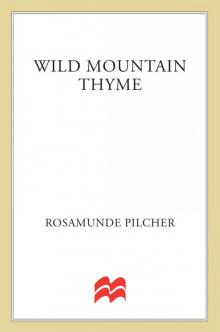 Wild Mountain Thyme
Wild Mountain Thyme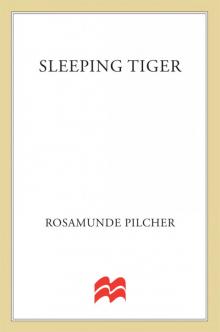 Sleeping Tiger
Sleeping Tiger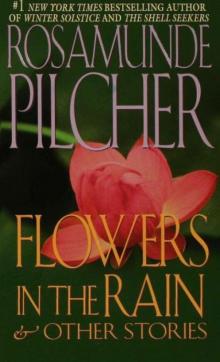 Flowers in the Rain & Other Stories
Flowers in the Rain & Other Stories September
September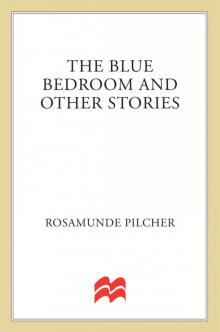 The Blue Bedroom: & Other Stories
The Blue Bedroom: & Other Stories The Carousel
The Carousel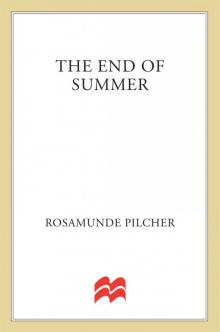 The End of Summer
The End of Summer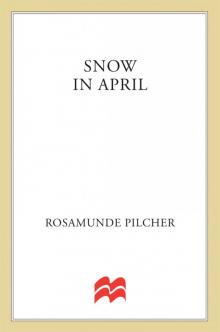 Snow in April
Snow in April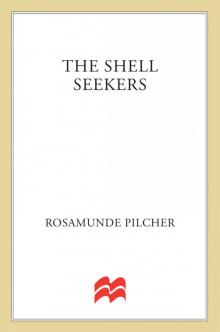 The Shell Seekers
The Shell Seekers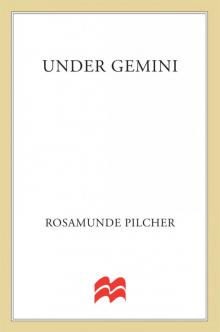 Under Gemini
Under Gemini The Empty House
The Empty House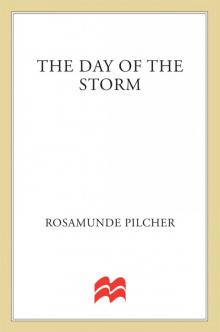 The Day of the Storm
The Day of the Storm Another View
Another View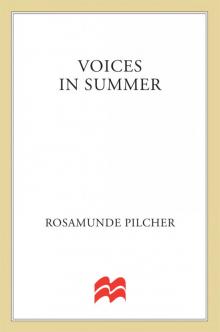 Voices in the Summer
Voices in the Summer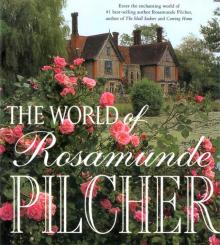 The World of Rosamunde Pilcher
The World of Rosamunde Pilcher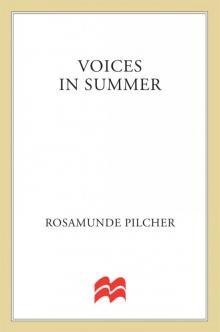 Voices In Summer
Voices In Summer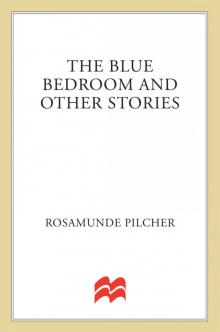 Blue Bedroom and Other Stories
Blue Bedroom and Other Stories